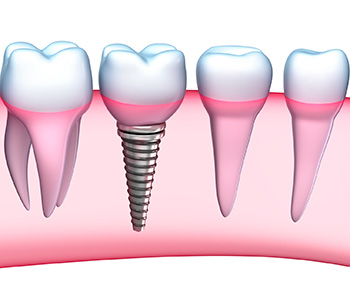
22
Jul
Dentist in Kirkland explains the procedure for dental implants

Today’s dental patient is fortunate to have multiple options for replacement of a tooth lost to extraction or trauma, or congenitally missing. Partial dentures and dental bridges have been around for a long time and remain sound solutions for many people. Yet dental implants have become a popular choice for lasting tooth replacement. Are you concerned about the procedure? Dr. Ann Kelley of Kingsgate Dental in Kirkland shares this helpful information to put your mind at ease.
Q – Why replace a missing tooth?
A – Structures of the mouth are designed to work together in support of vital bodily processes – taking in nourishment, breathing, communicating, and sleeping. When a tooth is lost, the body tries to maintain chewing function, compensating for the gap by allowing other teeth to shift. Spaces and crooked teeth spoil the appearance of your smile and may have a detrimental effect on oral health. Gaps overlaps, and shifted teeth are harder to keep clean. Harmful oral pathogens flourish on particles of food that do not get swept away by toothbrush or floss. That leads to gum disease, tooth decay, and costly dental work in the future.
Q – What is a dental implant?
A – Each natural tooth has a root that keeps the structure firmly anchored in the jawbone. A dental implant replicates the root. This small, screw-shaped device is made of titanium or another biocompatible material. It is placed into bone at the spot where your own tooth used to reside. In a process called osseointegration, bone cleaves to the implant. Then, the implant is finished or “restored” with a dental crown. Multiple missing teeth may be restored with an implant-retained bridge, and several implants can be placed to provide outstanding stability for a full denture.
Call now for your relaxed, complimentary consultation!Want a Beautiful Smile?…
Q – What distinguishes a dental implant from a denture or bridge?
A – All three tooth replacement options reinstate appearance, keep existing teeth from drifting, and restore some level of chewing function. Bone preservation, however, is an important distinction of the dental implant method. A denture or bridge sits on top of gum tissue. Without the stimulation of tooth roots or implants, the body senses diminished need for bone in that area. Minerals and nutrients from jawbone are absorbed back into the blood and sent to other parts of the skeletal system. The effect of diminished jawbone can be seen on the face as a sunken appearance, distorted proportions, sagging skin, and wrinkles.

Longevity is another beneficial difference. Since an implant becomes part of the body, with good dental care, it can last as long as a natural tooth. If the restoration is damaged or dislodged, it can be repaired or replaced without disrupting the implant.
Q – What is the step by step procedure for dental implants in Kirkland?

A – Dr. Kelley begins with a thorough examination to evaluate oral health. Gum disease should be addressed before considering a dental implant. She then explains treatment options, answers your questions, and makes a professional recommendation. If you decide on a dental implant, the procedure basically follows these steps:
- You are referred to a trusted associate who specializes in implant surgery. This doctor uses advanced imaging equipment to analyze bone density and determine how the implant should be positioned.
- On the day of surgery, your mouth is numbed. If you are nervous about the procedure, the doctor may provide an inhaled (“laughing gas”) or oral sedative, as well. However, with precision planning and special instruments, implant placement is minimally traumatic.
- Gum tissue is opened with a small incision.
- Space is made in the jawbone and the implant is inserted.
- The implant may be topped with a healing cap, that extends above the gum tissue. Alternately, the incision may be closed with a few sutures.
- You receive aftercare instructions to aid in uneventful recovery. For the reasonably healthy patient who refrains from smoking, the soft tissue site typically heals quickly.
- Over the course of several months, osseointegration occurs. You return to the oral surgeon for x-rays to be sure the implant is stable.
- Dr. Kelley takes over from here. She makes impressions of your mouth to design a dental crown. While gold may be an option, most patients prefer the natural appearance of a strong, lustrous porcelain crown.
- Impressions and shading information go to a professional off-site dental lab where your crown is fabricated. A temporary restoration may be placed meanwhile.
- You return in several weeks to have the interim crown removed and the new one secured to an abutment (post) in the center of the implant.
Would you like to learn more about the benefits of dental implants or the procedure? Call (425) 385-0080 to schedule a consultation with Dr. Kelley at Kingsgate Dental in Kirkland, WA.

